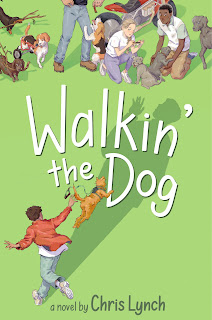Chris Lynch is the author of the new middle grade novel Walkin' the Dog. His other books include the young adult novel Freewill. He lives in Boston and in Scotland.
Q: What inspired you to write Walkin’ the Dog, and how did you create your character Louis?
A: Well, when the book was first signed up, it was going to be a police brutality book. Hmmm. Then, a lot changed. Much time passed, other folks addressed the subject, and I had to think harder than I used to about What does the world want from me at this stage? And what do I have to offer?
I noticed that many stories about the hot-button topics of our times seemed to include an undercurrent of concern about bystanders. And I thought, that's something I might have insight into. Never much of an activist myself, I still saw myself as being largely on the good-guy side of things. But how good can you be, really, if bad things happen while you remain uninvolved?
The next step was to get Louis interacting with the world. If he just stayed home and looked the other way, it would be a very short book.
I had long thought of doing a story based on the notion that dogwalkers make the world go round. Because, listening to the news, it always seems like dogwalkers travel the world like Scooby Doo and his pals, uncovering everything--though without the van.
So I put these elements together, and my boy began interacting with the world and the world began impacting on him. His progress from bystander to upstander became an obvious story arc gradually.
Q: Did you know how the novel would end before you started writing it, or did you make many changes along the way?
A: I had no idea how the story would end when I started out. I rarely do, because I find most of the worthwhile stuff in a book through the process of writing it.
But it was more extreme with Walkin’ the Dog, because the story, the point, and the journey changed so completely, several times. But as I tell my students, if it's not a journey of discovery for you, it won't be for your readers. Certainty is not a novelist's friend, methinks.
Q: What do you think the novel says about friendship?
A: I think what the novel says about friendship is that you need it. Louis believes at the beginning of the book that he doesn't need anybody else to have a happy and rewarding life. By the end he realizes that position is untenable.
In a wonderful bit of philosophy that I nicked (slightly altered) from the women's shelter, Rosie's Place, in Boston: The journey must be made in the company of others.
Q: You’ve also written for young adults--do you have a preference?
A: I'm not sure if I have a preference, say, for Young Adult over Middle Grade. I have done much more YA than MG, so maybe that's my more natural mode? But I will also say that learning to write middle grade made me a better, more attentive writer. You have to produce more effects with fewer devices if you want to write it honestly.
Q: What are you working on now?
A: I'm working on a number of other things now, which I like to do until one or more of them insist on being front-and-center.
The leader at the moment is a YA about a young man who is trying to fill the emotional vacancies in his life with the impossible promise of online gambling.
Also, trying to get a collaboration with Tracey Baptiste off the ground, which is a mashup of Caribbean and Celtic mythologies.
--Interview with Deborah Kalb


No comments:
Post a Comment